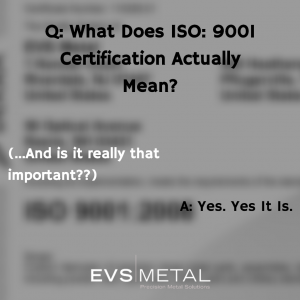 It’s a widely-used but still fairly mysterious term to many: ISO 9001 certification. It stands to reason that it’s generally understood to be related to manufacturing in some way, given its use primarily in that industry. And it’s likely that a fair number of individuals know that it is associated with quality control, especially if they work with or in the manufacturing industry. But quality is such a broad term and manufacturing such an incredibly massive sector, it’s easy to see why the details of ISO 9001 certification may not be immediately clear and therefore its importance easy to underestimate. So, what does ISO certification really mean, anyway?
It’s a widely-used but still fairly mysterious term to many: ISO 9001 certification. It stands to reason that it’s generally understood to be related to manufacturing in some way, given its use primarily in that industry. And it’s likely that a fair number of individuals know that it is associated with quality control, especially if they work with or in the manufacturing industry. But quality is such a broad term and manufacturing such an incredibly massive sector, it’s easy to see why the details of ISO 9001 certification may not be immediately clear and therefore its importance easy to underestimate. So, what does ISO certification really mean, anyway?
A Quick History of ISO 9001 Standards
ISO 9001 standards were born in the 1980s, and were a product of necessity. Why? Large manufacturers needed a way to streamline the process of sourcing parts from suppliers that had a guarantee of quality. At that time, the only way to do that would have been to personally audit the suppliers — a nearly-impossible and hugely expensive task. And on the other side, suppliers were tired of wasting time with customer audits that could have been better spent actually making parts. ISO 9001 standardization was a boon to both; a third-party audit from an independent certification body or firm that was free of bias set both manufacturers and suppliers free to do what they did best — actually make things.
ISO 9001 Basics
Although the standards and certification process have undergone changes over the last four decades, the basics tenets of ISO 9001 have remained the same. In order for companies to certify, their quality management system (QMS) must meet a set of requirements, including:
- Demonstration of the ability to consistently provide product that meets customer and applicable statutory and regulatory requirements
- Willingness to enhance customer satisfaction through the effective application of the system, including processes for continual improvement of the QMS and the assurance of conformity to customer and applicable statutory and regulatory requirements
This may sound vague, and it is by design. The standards are intended to be generic so they can be utilized for companies of any size, that produce almost any type of product.
How Do ISO Standards Affect EVS Metal?
In EVS Metal’s case, it means our company meets any and all requirements set out for quality management systems by ISO (International Organization for Standardization), the certifying organization, and this has been confirmed by an independent auditor. Some of the ways in which we meet these requirements include:
- Utilizing computerized quality records to provide traceability and accountability
- Employing the cutting-edge QA technologies to accurately scan and inspect all parts
- Cultivating a culture dedicated to continuous improvement
At EVS Metal, we pride ourselves on our exceptional attention to detail for each and every project, which begins and ends with a focus on quality service and a dedication to meeting ISO 9001 standards. Find out how our team can add value to your manufacturing supply chain by requesting a quote online, or giving us a call at (973) 839-4432 today.





